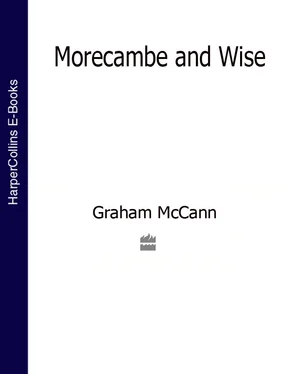The newspaper critics, though unimpressed by the standard of many of the programmes being transmitted, were at least prepared to persevere with the enterprise. The Observer’ s J. P. W. Mallalieu, with his distinctive brand of hopeful ambivalence, urged his fellow viewers not to give up:
We select, and what we select more often than not stimulates rather than depresses. I do not mean that what we select is always good. It is often terrible. But even in what is probably the most terrible BBC effort of all – the portrayal of Variety – when I have seen a performer on my screen I am more interested than I would otherwise have been to see him on the stage, if only to find out whether he is quite as bad as all that. 14
It was a different story in America, where Variety was the least of commercial television’s worries. Unencumbered by any public service ethic, and urged on by sponsors eager for it to embrace all of the most glittering prizes thrown up by the more demotic of pursuits, American television was busy raiding vaudeville, radio and Hollywood in search of available talent. By the early fifties it could boast such hugely popular shows as The Honeymooners, I Love Lucy, The Burns and Allen Show, The Jack Benny Show, The Milton Berle Show, Your Show of Shows, Groucho Marx’s You Bet Your Life, The Abbott and Costello Show, The Colgate Comedy Hour and Ed Sullivan’s increasingly influential The Toast of the Town. It was estimated during this period that television stations in New York were devoting as much as 53.3 per cent of their time to light entertainment – in stark contrast to the BBC in London, which was devoting as little as 15.7 per cent to the same kind of material. 15This yawning disparity was underlined by the BBC’s use of several US imports in its schedules. When, for example, Amos ʼn’ Andy was shown for the first time on the BBC in 1954, the Daily Mirror’ s Clifford Davis greeted it with the warmest of praise, pointing out that such a ‘slick, professional effort’ served to make the Corporation’s home-grown comedy shows seem ‘puny by comparison’. 16
It was, in some ways, an unfair comparison to make. For all the brilliance of the very best of American television’s Variety output, it was still the case that the sheer crassness of the rest was closer to the norm, and even if the BBC had somehow found a way to raise the vast sums of money it would have needed to lure stars of comparable stature to its own studios it seems unlikely that many of them would have risen to the bait. Variety agents and managers – echoing their earlier reaction to the advent of radio – eyed television with considerable suspicion, believing initially that it represented little more than a particularly devious way of exhausting an entire career’s worth of material in a single evening, and, as a consequence, hastening the decline of an already precarious business.
Undeterred by such predictable resistance, the BBC struggled on, but for some time yet Variety on television would continue to take the form of televised Variety rather than television Variety. The best examples of this – such as Barney Colehan’s self-consciously antiquated The Good Old Days (which ran from 1953 to 1983), and Bill Cotton Senior’s band shows – had their own unpretentious charm, and the BBC would learn to produce them far more impressively than any of its future competitors ever would, but the worst – such as the half-hearted Café Continental (a cabaret-style show based at the Chiswick Empire) – seemed merely superfluous. It was not obvious, however, how the situation might best be remedied. One problem was that Variety performers tended to fail on television because they would over-project, forgetting the fact that now, instead of reaching out above all the hubbub to the back of the cavernous halls, they were supposed to be reaching directly into someone’s cosy front room. Jimmy Grafton, one of the producers obliged to deal with this issue, recalled a typical example: ‘Ethel Revnell, who was a very strong cockney character comedienne in Variety, was in an early [television show]; we brought her in to play a character in a situation comedy, and she played it like a Variety sketch, expecting she was going to get a laugh when she came on, and grimacing at the audience. She was so much larger than life that we had to scrap the show.’ 17
The performers who survived the transition were those who had been both willing and able to adapt. Terry-Thomas, for example, was handed his own comedy series, How Do You View?, in 1951, and others, such as Frankie Howerd, Max Wall, Arthur Askey, Jimmy Edwards and Bob Monkhouse started to appear on a regular basis soon after. Terry-Thomas commanded £ 100 for each fortnightly show – and by 1953 this had risen to 140 guineas 18– but most of those who were signed up at this time were placed on salaries that, compared both to radio and the most prestigious Variety circuits, were relatively modest. Ronnie Waldman – the BBC’s Head of Television Light Entertainment – certainly did believe in the viability of television Variety, but he was subject to the same degree of financial limitations as his opposite number in radio, even though his expenses, of necessity, were far greater (as average programme costs for television in 1954 were £ 892 per hour 19). As a consequence, promising radio stars, such as Bernard Braden, or up-and-coming screen stars, such as Norman Wisdom, tended to be too expensive to hire more than occasionally. ‘Personality programmes’, such as the very popular What’s My Line?, proved to be far easier and cheaper to broadcast than Variety, as they had no need of well-written scripts or elaborate stage sets, and they also created their own television-bred celebrities, such as the notoriously brusque Gilbert Harding.
Waldman, however, was a determined man. Writing in the Radio Times shortly after assuming control of his department in 1951, he declared that he and his team of producers were committed to the creation of ‘something that had never existed before the invention of television – something that we call Television Light Entertainment … Our aim’, he continued, ‘is now to try and bring the entertainment profession as a whole to believe, with us, that television does not mean the mere photographing of something that could be entertaining in a theatre or a cinema. Television demands a very high standard of performance and an immense degree of polish from its artists. Inexperience and lack of “authority” ... are things with which the television camera has no mercy. Only the best is good enough for television.’ 20 His department, he insisted, was going to be dedicated to the ideal of making ‘as many people as possible as happy as possible’. 21Eager to find new and exciting ideas with which he might invigorate his department, he set off on a fact-finding tour of the United States of America – ‘to see how the other chap does it’ 22– taking in 114 different television programmes during a tour that took in New York, Connecticut, Illinois, California, Arizona and Nevada. What impressed him most was not the commercial aspect of American television, but rather its lack of embarrassment about the idea of popular television. On his return to Britain, Waldman was in a bullish mood: his ambition, he announced, was ‘to give viewers what they want – but better than they expect it’. 23By the beginning of 1954, he took great pleasure in drawing his colleagues’ attention to the fact that the Light Entertainment department was now producing around 400 shows per year – ‘a vastly greater output than that of any theatrical or film organisation’. 24This was in spite of the fact that its full-time staff numbered no more than thirty seriously over-worked people. In the future, he concluded, there would be no excuse for a lack of variety in television Variety.
Читать дальше











![Brian Thompson - A Monkey Among Crocodiles - The Life, Loves and Lawsuits of Mrs Georgina Weldon – a disastrous Victorian [Text only]](/books/704922/brian-thompson-a-monkey-among-crocodiles-the-life-thumb.webp)
